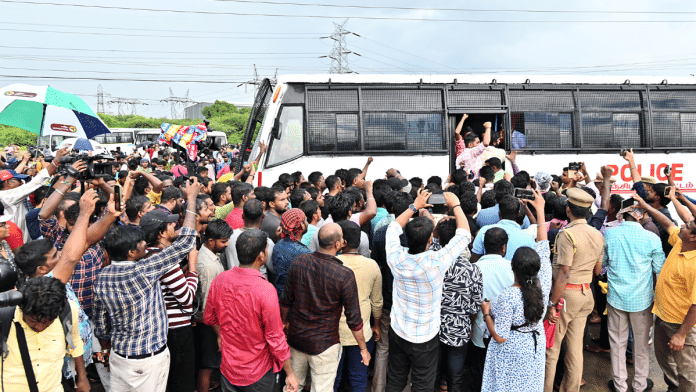New Delhi: The registration of the Samsung India Workers Union (SIWU) is a victory for the persistent struggle of India’s working class and this success will be an inspiration for similar other labour movements, according to several stakeholders.
Another point that was brought up by the labour rights activists and leaders is the delay in implementation of a Madras High Court order that set a six-week deadline to the Tamil Nadu government to register the union.
As the certificate of registration was given on the last day of the deadline, SIWU president E. Muthukumar highlighted that the HC had ordered the registration on 5 December, 2024, granting six weeks for compliance. “This delay demonstrates systemic bias against labour rights,” he said in a written statement.
On Monday, the Tamil Nadu Labour Department officially registered the SIWU backed by the Centre for Indian Trade Unions (CITU), a development that took place at the end of a seven-month struggle by Samsung employees at Sunguvarchatram in Kanchipuram district.
More than 1,000 workers had staged a 37-day strike starting on 9 September last year, demanding registration of their union, better working conditions as well as an increase in wages. It all began in June when the union was formed and in the same month, its members sought registration online with the Registrar of Trade Unions in Chennai. On 8 October, the Kancheepuram police conducted midnight arrests of several Samsung workers and dismantled the protest site on the next day.
During the court hearings, Muthukumar said, advocates N.G.R. Prasad and Sivakumar argued that the Tamil Nadu government unjustly delayed registration to support Samsung India, despite legal provisions favouring formation of unions.
The government, he emphasised, should ensure international and Indian companies respect constitutional trade union rights and revise anti-labor policies, including police interference and false cases against workers. “CITU is now the only registered majority union in the company, and the administration must engage in an amicable resolution of workers’ demands.”
The registration of the SIWU was a victory for the persistent struggle of India’s working class, he asserted.
Muthukumar said that the administration should now come forward to reach an agreement based on the demands of the workers. “Government’s labour policy on rights should be publicly declared and anti-labour police policy, such as denial of permission and interference by police in labour protests and filing of false cases, should be completely overhauled by Senior Advocate NGR Prasad, who advocated for us in this struggle for union registration,” he noted.
‘Unions are not anti-business’
Amit Chakraborty, a trade union activist working in Gurugram’s Manesar Industrial Base, told ThePrint that as per the Trade Unions Act, forming a union is just a technical process.
The Act allows workers to form and register trade unions, giving these unions legal recognition, protects workers during lawful strikes, and ensures their right to work together to improve wages and working conditions.
“The success of Samsung is for the rest of the workers also; we have programmed in the solidarity of Samsung. There is a simultaneous protest of Maruti workers going on for the past four months. In such a struggle, the success of one place is an inspiration for the rest of the workers,” he said.
Noting that this success was being hailed as a turning point in the Indian labour movement, Chakraborty emphasised the significance of unions for securing basic rights. “Without unions, workers have no scope for bargaining, often leading to the management violating labour laws unchecked.”
Samsung has long implemented anti-union policies, using internal grievance committees as a “facade”, according to Santosh, an activist working with digital media platform Workers UNITY. “Workers demanded a proper mechanism to address their grievances, including fair salary increments, which led to the strike.”
He alleged that Tamil Nadu, despite promoting itself as a business-friendly state, often suppresses unions under the guise of attracting foreign investment, as seen during the 2021 Foxconn protests. “Workers deserve the right to form unions. Unions are not anti-business; they ensure fairness,” he asserted.
Similarly, Sourya Majumder, who is associated with a student-youth movement highlighting the demands of workers across India, told ThePrint that the level of contractualisation and informalisation has been growing within work sectors even within the formal organised sectors in industrial areas, leading to the bulk of work being done today by non-permanent workers divided across various categories.
With the gig economy rising, the status of workers has been changed to do away with any claim with rights, the Collective Delhi’s general secretary said. “In that way, these unionisation attempts are significant attempts to demand dignified and permanent employment for all.”
(Edited by Tony Rai)
Also Read: Tensions simmer in Bastar between Christians & Right-wing outfits as conversion takes centre stage







This is good news for other states with high ambitions. Tamil Nadu is becoming the next West Bengal with workers unions and related stupidity going on unchecked.
States like Assam, Odisha and Andhra Pradesh should take the initiative and woo multinationals having manufacturing units in Tamil Nadu. No MNC wishes to deal with workers union and put up with their idiotic demands. Samsung would be most willing to move out of Tamil Nadu given the latest developments.